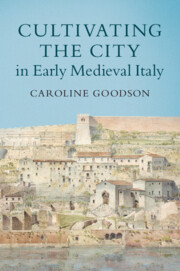‘Caroline Goodson leads the reader on a fascinating journey through the cities of early medieval Italy exploring their complex landscape through archaeological and botanical evidence. She shows the enormous potential of gardens and orchard for economic and social history, by providing a vivid and original image of the interaction between nature and urban culture.’
Maria Cristina La Rocca - Università degli Studi di Padova
‘A distinctly original book, based on thorough integration of textual and archaeological sources. It refreshes a traditional topic in Italian medieval historiography, urban history, showing postclassical cities were places of agricultural production. Cultivating the City in Early Medieval Italy also brings out what was special about early medieval gardening practices in Italy by addressing the topic of urban gardening in a long duration, from imperial Roman times to the Year 1000. Its sustained discussion of that mysterious Dark Age phenomenon, the accumulation of ‘Dark Earth,’ is particularly exciting. For historians of city and countryside, early medieval archaeologists, and any who have wondered how gardens changed during the first millennium AD, this study provides many insights.’
Paolo Squatriti - University of Michigan
‘This highly original book offers important new insights into the transition from the ancient world to the Middle Ages. Clear, deeply learned, and full of surprises, it transforms what we thought we knew about early medieval urban economies and townscapes by unearthing what their inhabitants grew and ate.’
Julia Smith - University of Oxford
‘An arresting book because it confronts a real problem head on: does dark earth in post-Roman settlements signal abandonment or something much more positive like growing things to eat; and because it challenges us to believe that there were no markets in, of all places, early medieval Italian cities.’
Wendy Davies - University College London
‘The book impresses with its multi-perspectivity: besides archaeological and historical sources, the author draws on archaeobotanical studies on the diversity of plants, on economic-historical results on the circulation of coins and on climatological findings on weather changes.’
Karl Ubl
Source: Historische Zeitschrift
‘This is a fascinating and beautifully written book whose significance merits wide use by scholars. Not only those who are interested in the quotidian realities of Italy and the Mediterranean in Late Antiquity and the Early Middle Ages but also readers who want to understand deeper and slower processes of change will find much of value here … Clearly this is an important work.’
Christopher Heath
Source: Al-Masāq
‘Goodson’s methodology in Cultivating the City represents an important contribution to garden studies and has the potential to guide other garden and landscape historians to bring the lens of cultivation to larger social, political, and economic debates in the field.’
Abigail P. Dowling
Source: H-Net: Humanities and Social Science Reviews Online
'… a well-written and persuasive book which deserves to be read by anyone interested in medieval urban evolution.'
Yuri A. Marano
Source: Medieval Archaeology
‘… this book will become an essential text for every study on the urban phenomenon in medieval Italy.’
Riccardo Santangeli Valencia
Source: Quellen und Forschungen aus italienischen Archiven und Bibliotheken
‘The conclusion deftly unites Goodson’s own argument with the scholarly threads of Bryan Ward-Perkins and Peter Brown. Goodson’s argument is clear, comprehensive, and compelling. While her study is mostly restricted to Italy, the wider implications of her research are evident. Goodson presents a new framework for understanding not only the physical, material changes that marked the transformation of the Roman world, but the intellectual ones as well Mark Lewis, A Journal of Medieval Studies.’
Mark Lewis
Source: Speculum
‘[This book] represents a new approach to discussing the cultural and social changes that marked late antiquity, taking into consideration the real, lived experience of those who both drove and felt this transformation.’
Mark Lewis Tizzoni
Source: Speculum: A Journal of Medieval Studies



